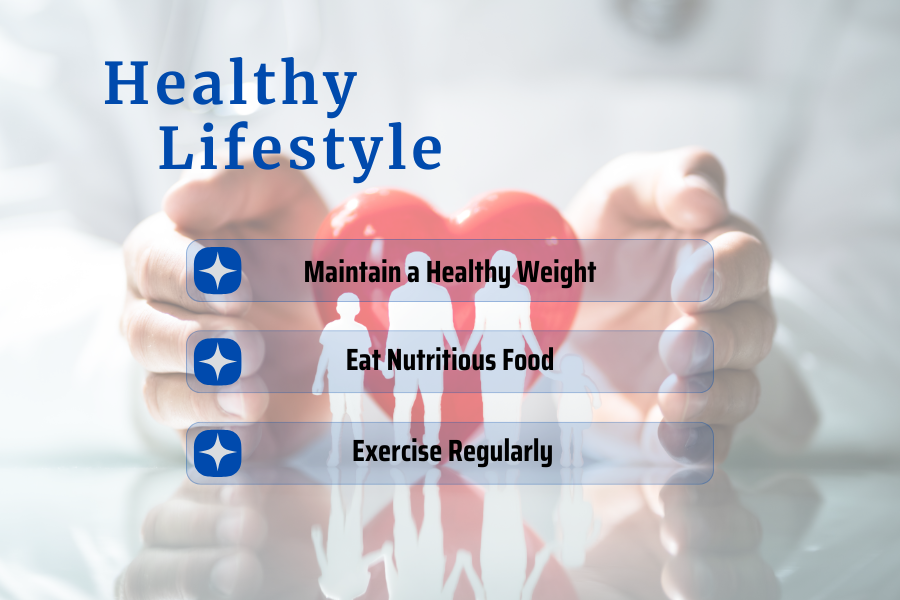Preventing Cancer

Understanding How to Prevent Cancer
Adopting healthy lifestyle choices can prevent many cancers. Research shows that lifestyle changes such as staying active with regular exercise, maintaining a healthy weight, eating a nutritious diet, and quitting smoking and alcohol can prevent 45% of cancer deaths in adults and lower the risk of developing cancer.
Cancers including breast cancer, colon cancer, pancreatic cancer, prostate cancer, stomach cancer, and others have lifestyle factors linked to their risk.
It is never too early or too late to develop healthy habits. Start with small, sustainable steps to manage your body weight through a healthy diet and regular exercise.
Importance of Weight Management in Cancer
Weight management, exercise, healthy diet, and nutrition plays a vital role in reducing cancer risks and promoting overall health.
Weight Management
Excess body weight is associated with inflammation and inflammation is a known factor for the development of cancer. Additionally, excess weight strains the entire body and is linked to over 50 health conditions.
Obesity-Related Health Conditions
- Type 2 Diabetes: Chronic condition affecting blood sugar regulation. High blood sugar increases the risk of complications, including cancer.
- High Blood Pressure: Often linked to excess weight, high blood pressure strains the heart and arteries, increasing cancer risks.
- Heart Disease: Excess weight leads to increased blood volume and strain on the heart, which can indirectly influence cancer risks.
- Emotional Well-Being: Obesity is associated with a higher likelihood of depression, which can impact motivation for healthy habits.
Benefits of Maintaining a Healthy Weight
- Reduced inflammation
- Helps balance insulin and estrogen levels
- Decreased likelihood of developing obesity-related conditions like type 2 diabetes and heart disease.
Talk to Your Healthcare Provider
Open communication with your provider can help:
- Address barriers to weight loss or exercise
- Develop a personalized nutrition and activity plan
- Monitor progress through regular check-ups and lab tests
Practical Tips and Tools

Managing weight is not about achieving a specific size but adopting sustainable habits including healthy diet and regular exercise.
1. Food Journaling
- What to Record: Meals, snacks, beverages, portion sizes, dates and times.
- Why to Record: Understand eating habits, manage portions, and identify triggers for unhealthy choices so that behavioral improvements can be made.
2. Meal Planning
- Create a shopping list with healthy options.
-
Include cancer-fighting foods like colorful fruits and vegetables, healthy fats, and lean proteins.
- Prep meals in advance to avoid impulsive, unhealthy eating.
- Keep easy to grab, healthy snacks (fresh fruits, trail mix).
3. Exercise Plan
- Set realistic goals, like losing 5-10% of body weight.
-
Engage in 30 minutes of moderate exercise five days a week.
- Choose enjoyable activities to build consistency.
- Seek professional guidance from healthcare providers, dietitians, or fitness experts.
What You Need To Know
- Monitor calorie intake: Burn more calories than you consume but aim for a sustainable loss of 1–2 pounds per week.
- Regular exercise: Engage in at least 150 minutes of moderate aerobic activity or 75 minutes of vigorous activity weekly.
- Balanced meals: Focus on whole foods, lean proteins, fruits, vegetables, and whole grains. Limit processed foods and sugary drinks.
- Mindful eating: Eat slowly and pay attention to hunger and fullness cues.
Source: CDC Healthy Weight Loss
- Start small: Make gradual changes, like adding one extra serving of vegetables daily.
- Plan meals: Prep balanced meals in advance to avoid impulsive eating.
- Track your intake: There are applications that can help monitor eating patterns.
- Limit distractions: Avoid eating in front of screens to focus on portion sizes and satiety.
Source: Academy of Nutrition and Dietetics Healthy Eating Habits
- ChooseMyPlate.gov: Offers personalized nutrition guidance.
- Weight Watchers: Provides structured programs and community support.
- American Heart Association’s Nutrition Center: Offers recipes and tips for healthy eating.
- Dietitians: Find a registered dietitian near you through EatRight.org. FPBCC | Nebraska Medicine offers nutrition services. Learn more here.
Before considering any weight loss medication, it's important to talk to your healthcare provider. They can help determine if medication is appropriate for you.
Prescription medications can be effective for individuals with a BMI over 30 (or 27 with health conditions).
Common medications: Orlistat, Phentermine, Semaglutide.
Side effects: Nausea, diarrhea, or increased heart rate.
Always consult with your healthcare provider before starting any medication to ensure it's the right choice for your health.
Bariatric surgery is an option for individuals with: BMI ≥40 or BMI ≥35 with obesity-related health issues.
Types of surgery include gastric bypass, sleeve gastrectomy, and adjustable gastric banding. Risks can include infection, malnutrition, or digestive issues.
Always check with your healthcare provider to determine if Bariatric surgery is right for you.
Yes, consider consulting the following healthcare professionals:
Primary Care Physician (PCP): To evaluate your overall health and refer you to appropriate specialists.
Dietitian or Nutritionist: For personalized guidance on meal planning and healthy eating habits.
Behavioral Therapist: To address emotional or psychological factors that may be contributing to weight gain.
Endocrinologist: If hormonal imbalances are influencing your weight.
Source: CDC Healthy Weight Resources
Initially, it’s common to have monthly visits to monitor progress and make adjustments to your plan.
As you achieve stable weight management, your provider may suggest transitioning to quarterly or semi-annual visits.
Your provider will work with you to determine the best follow-up schedule based on your individual needs and treatment plan.
Source: Obesity Action Coalition Follow-Up Care
TOPS (Take Off Pounds Sensibly): Community-based weight-loss groups with chapters throughout Nebraska.
Weight Watchers (WW): Offers in-person meetings at various locations across Nebraska.
Nebraska Medicine's Weight Management Program: Provides group and one-on-one support tailored to your needs.
YMCA of Greater Omaha: Offers wellness coaching, fitness programs, and support for overall health.
Source:
- Nebraska Medicine Weight Management Program
- TOPS Find a Chapter
Resources
Many online resources are available to help you learn about obesity, overweight, and related health concerns. Whether you're looking for information on weight management or adopting a healthy diet, our health educators are here to provide you with the support and guidance you need. Send us your queries: coe@unmc.edu
Cancer Prevention Awareness Social Media Messages
Access and share downloadable educational materials to help spread awareness. For any queries on how to further collaborate, please email us: coe@unmc.edu